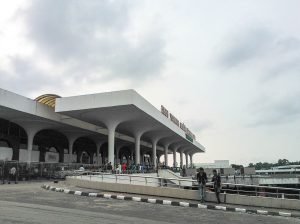For 32 consecutive years, China has made a point of sending its foreign minister to Africa for the first diplomatic trip of the new year. Newly appointed Foreign Minister Qin Gang was set to continue the trend into 2023, with scheduled visits to “Ethiopia, Gabon, Angola, Benin, Egypt, the African Union Headquarters and the League of Arab States Headquarters… from January 9 to 16, 2023,” according to China’s Foreign Ministry.
But before Qin arrived in Ethiopia, he actually made a surprise stop somewhere else.
During what China’s Foreign Ministry described as “a technical stopover,” Qin “had a brief meeting with Bangladeshi Foreign Minister Abul Kalam Abdul Momen at an airport in Dhaka.”
“The two sides spoke highly of the friendship between China and Bangladesh, and agreed to strengthen exchanges in the new year and jointly work for new progress in bilateral relations,” the ministry said in a statement.
The ministry offered no further detail or explanation, including at the regular daily press conference on January 10.
The unexpected visit was odd, especially as it undermines China’s longstanding tradition of honoring ties with African countries early in January each year. In an attempt to avoid that complication, both China and Bangladesh emphasized that it was not an “official” visit but merely a “stopover.” But the fact remains that Qin’s first in-person meeting of the new year – and, in fact, his first such meeting since assuming office – was with Bangladesh’s foreign minister, not an official from an African state.
The timing of the visit suggests urgency in another way as well: According to Bangladeshi media, “Foreign Minister Momen received his Chinese counterpart upon his arrival at around 1:58am.” The two spoke for less than an hour, with Qin departing at around 2:50 a.m.
What needed to be discussed so badly that Bangladesh’s foreign minister headed to the airport for a middle-of-the-night conference?
While Beijing’s readout offered little clue, Momen was more forthcoming. In comments to Bangladeshi media after the meeting, he stressed that his conversation with Qin touched on the massive trade deficit between the two countries. Bangladesh imports around $13 billion worth of goods from China each year, while its exports to China are stuck at under $800 million. That over $12 billion deficit is of special concern to Dhaka given the shaky condition of its foreign exchange reserves amid the global economic turmoil sparked by the war in Ukraine.
Frustration was evident in Momen’s comments about unfulfilled promises from China. He noted Chinese President Xi Jinping’s 2016 visit to Bangladesh resulted in many investment pledges that have not materialized over six years later. Momen also complained that a previous agreement to remove duties and quotas on 98 percent of Bangladeshi goods has not been implemented.
On Bangladesh’s side, another one of its top priorities is seeking a resolution to the Rohingya refugee crisis. Over 1 million Rohingya refugees from Myanmar are currently living in camps near the Bangladesh-Myanmar border; most have been there since 2017, when Myanmar’s military launched a genocidal campaign against the Rohingya. Straining under the burden of providing for over a million refugees, Dhaka wants to push forward with repatriation as quickly as possible. That prospect however, looks more remote than ever in the wake of the 2021 coup in Myanmar, which sparked a new round of violence.
China is one of the foreign governments closest to the new military junta, and Bangladesh wants Beijing to use its influence to raise the Rohingya issue. As the Dhaka Tribune put it, citing Momen, “The Bangladesh Foreign Minister sought special measures from the Chinese side so that the problem could be resolved as soon as possible.”
In return, Momen offered China reassurances about Bangladesh’s neutral stance in the geopolitical competition between Beijing and Washington. “We maintain a balanced foreign policy. This is our principle,” Moment told reporters. He assured Qin that Bangladesh will “extend our support to you from time to time.”
The United States and China “might have their own problems. That is their headache, not ours,” he continued. “We want to maintain good relations with both.”
That said, Dhaka seems aware that its friendly ties with all parties in the geopolitical competition opened a window of opportunity for Bangladesh: “We are getting much importance,” as Momen put it.
On that note, Qin’s surprise stopover in Bangladesh comes just ahead of a flurry of U.S. diplomatic activity. Eileen Laubacher, the senior director for South Asia at the White House’s National Security Council, arrived in Dhaka for a four-day visit on January 7; she met with Momen on January 9. Donald Lu, the U.S. assistant secretary of state for South and Central Asian affairs, is expected to follow suit on January 15.
Perhaps these visits from U.S. officials helped motivate Qin’s own visit, however brief. Likewise, the nighttime conversation with Qin might provide Momen with some implied ammunition in his talks with U.S. counterparts.
Qin, meanwhile, has now begun his planned Africa tour, landing in Ethiopia on January 10.













